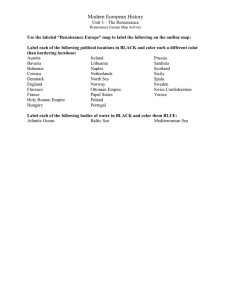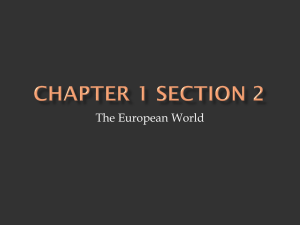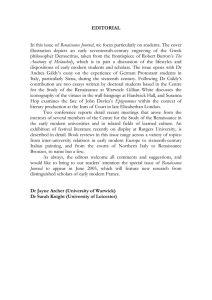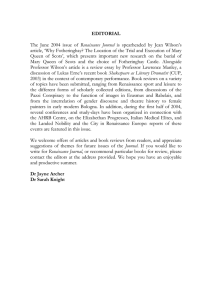Old French and Early Modern French Then
advertisement
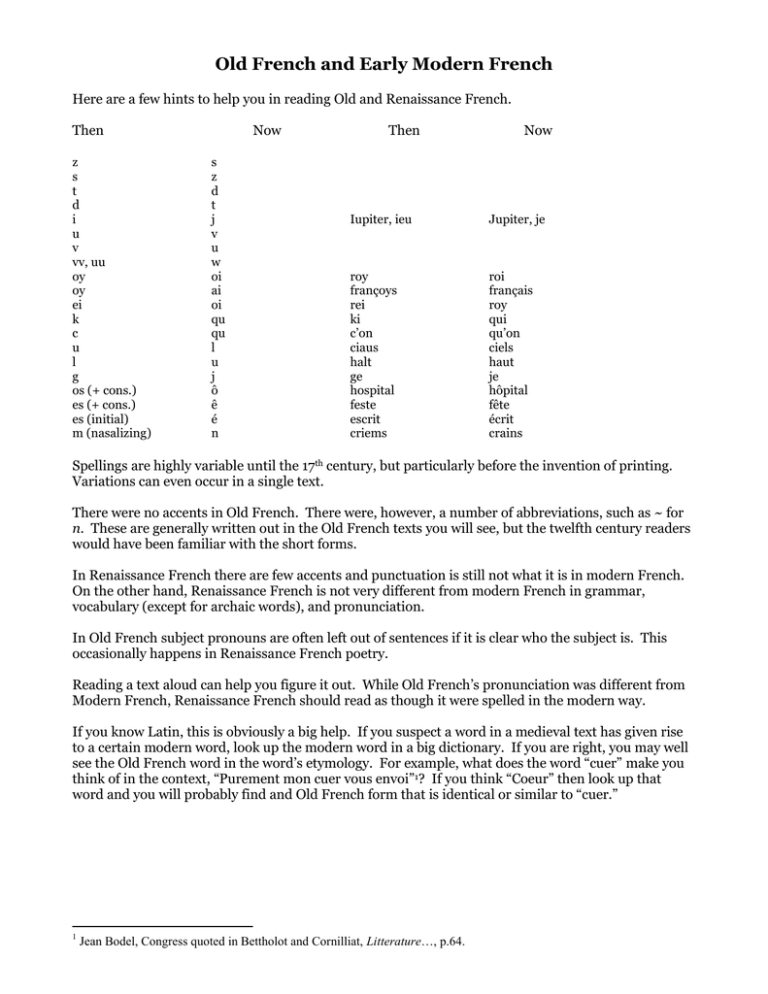
Old French and Early Modern French Here are a few hints to help you in reading Old and Renaissance French. Then z s t d i u v vv, uu oy oy ei k c u l g os (+ cons.) es (+ cons.) es (initial) m (nasalizing) Now s z d t j v u w oi ai oi qu qu l u j ô ê é n Then Now Iupiter, ieu Jupiter, je roy françoys rei ki c’on ciaus halt ge hospital feste escrit criems roi français roy qui qu’on ciels haut je hôpital fête écrit crains Spellings are highly variable until the 17th century, but particularly before the invention of printing. Variations can even occur in a single text. There were no accents in Old French. There were, however, a number of abbreviations, such as ~ for n. These are generally written out in the Old French texts you will see, but the twelfth century readers would have been familiar with the short forms. In Renaissance French there are few accents and punctuation is still not what it is in modern French. On the other hand, Renaissance French is not very different from modern French in grammar, vocabulary (except for archaic words), and pronunciation. In Old French subject pronouns are often left out of sentences if it is clear who the subject is. This occasionally happens in Renaissance French poetry. Reading a text aloud can help you figure it out. While Old French’s pronunciation was different from Modern French, Renaissance French should read as though it were spelled in the modern way. If you know Latin, this is obviously a big help. If you suspect a word in a medieval text has given rise to a certain modern word, look up the modern word in a big dictionary. If you are right, you may well see the Old French word in the word’s etymology. For example, what does the word “cuer” make you think of in the context, “Purement mon cuer vous envoi”1? If you think “Coeur” then look up that word and you will probably find and Old French form that is identical or similar to “cuer.” 1 Jean Bodel, Congress quoted in Bettholot and Cornilliat, Litterature…, p.64. Old French and Renaissance French Worksheet Use this page to list spelling differences you find in the text(s) indicated Renaissance Modern Renaissance French: your example Modern French : your example z s __________________ __________________ s z __________________ __________________ t d __________________ __________________ d t __________________ __________________ i j __________________ __________________ u v __________________ __________________ v u __________________ __________________ vv, uu w __________________ __________________ oy oi __________________ __________________ oy ai __________________ __________________ ei oi __________________ __________________ k qu __________________ __________________ c qu __________________ __________________ u l __________________ __________________ l u __________________ __________________ g j __________________ __________________ os ô __________________ __________________ es ê __________________ __________________ es é __________________ __________________ m n __________________ __________________ ____ __________________ __________________ ____ __________________ __________________ C:\Documents and Settings\jboney\Desktop\Old French and Rennaissance French.doc Last printed 6/18/2012 10:29:00 AM
